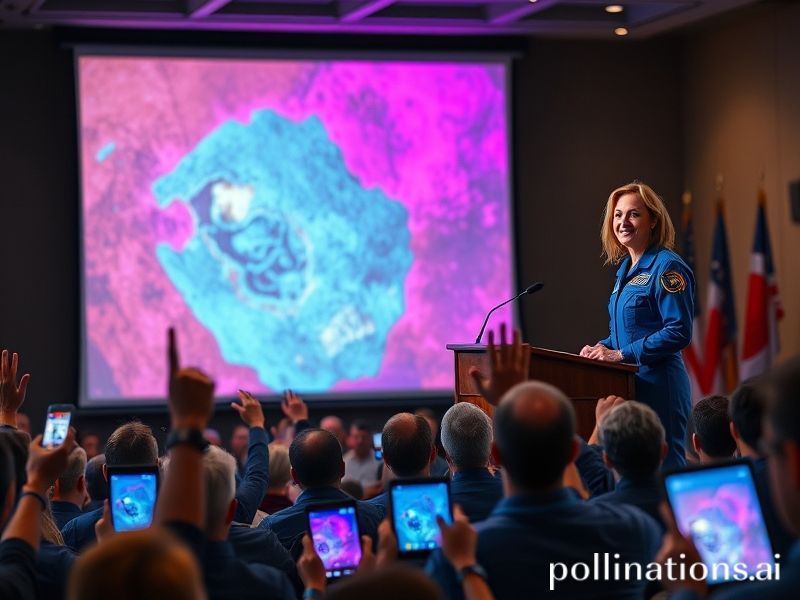NASA Discovers Life on Mars; Earth Immediately Argues Over Parking and Royalties
NASA Announces Life on Mars: Planet Earth Reacts Like a Kid Who Found Out Santa’s Real, Then Immediately Asks Who Gets the Mining Rights
By the time the first tremor hit the Tokyo Stock Exchange, the rover’s panoramic selfie—complete with a polite, lichen-like organism waving what appeared to be a pseudopod—had already been memed into oblivion. Within 34 minutes, #MartianLivesMatter was trending worldwide, sandwiched between a K-pop comeback and footage of a Ukrainian drone serenading a Russian trench with a Taylor Swift chorus. Humanity, ever the multitasker, was processing its first confirmed extraterrestrial neighbor the same way it digests a celebrity divorce: in 280 characters or less, preferably with a reaction gif.
Reaction, of course, varied by longitude. In Brussels, EU ministers convened an emergency session titled “Planetary Neighbourhood Policy,” which is bureaucrat-speak for “how do we regulate something that doesn’t pay taxes?” The Chinese National Space Administration issued a terse statement applauding “international cooperation in the cosmic commons,” while quietly filing 147 patents on Martian photosynthesis. Meanwhile, El Salvador’s president—never one to miss a branding opportunity—announced that Martian microbes are welcome to become legal tender, provided they invest in volcano bonds.
Across the Atlantic, American cable news split along predictable lines. One network convened a panel of theologians to debate whether the lichen possesses a soul (verdict: “unclear, but probably votes Democrat”). Another ran an exclusive with a Florida man claiming he’d been probed by the very same species in 1997; ratings soared 38%. Wall Street, ever allergic to existential wonder, had already priced in a 12% bump for any company with “Astro,” “Bio,” or “Terraform” in its name. Dogecoin spiked because, well, Dogecoin.
The Global South, accustomed to being the quarry rather than the explorer, watched with a kind of bemused fatigue. Kenyan scientists who’ve spent decades cataloguing extremophiles in the Rift Valley noted—politely—that the lichen’s metabolism looks suspiciously like something they found in a soda lake back in ’08. Bolivian president Luis Arce quipped that if the microbes want lithium, they can queue behind Tesla like everyone else. In India, ISRO congratulated NASA while simultaneously fast-tracking its own mission to see whether the Martian organism enjoys curry; domestic media immediately speculated on the microbe’s caste.
International bodies scrambled to appear relevant. The UN Outer Space Affairs Office issued a 47-page “non-binding framework for microbial dignity.” The Vatican dispatched a Jesuit astrobiologist to determine if baptism requires a pressure suit. FIFA, sensing opportunity, floated a zero-gravity World Cup qualifier on Phobos, scheduling it right between the Saudi investment summit and the Qatari winter games—because nothing says “universal brotherhood” like flogging broadcast rights.
Beneath the hoopla, darker calculations simmered. Defense ministries dusted off contingency plans for “exo-biosecurity,” a phrase that sounds like a video-game DLC but translates to “who nukes whom if the lichen unionizes.” Private aerospace firms quietly updated their EULA’s: any citizen who boards a Mars shuttle automatically waives class-action rights if the lichen turns out to be carnivorous. Somewhere in Geneva, a junior lawyer Googled “interplanetary habeas corpus.”
And yet, for one brief news cycle, the usual tribal blood feuds paused. Israelis and Palestinians shared the same stunned emoji. Russian trolls momentarily stopped sowing discord to ask, in genuine bewilderment, “what if they have better vodka?” Even British tabloids forgot Meghan Markle long enough to wonder if the lichen prefers Marmite. It was, in the words of a Lagos Uber driver interviewed by the BBC, “like the whole world got a push notification from God, then immediately tried to swipe it away.”
The organism itself, of course, remains oblivious—too busy photosynthesizing iron oxides to file for intellectual property protection. Whether humanity will treat it as kin, commodity, or kryptonite is an open question. But if history is any guide, we’ll probably do all three simultaneously, then post the receipts on TikTok. In the meantime, the lichen keeps waving that pseudopod, a tiny green ambassador from a colder world, reminding us that the universe is older, quieter, and far more patient than our seven-hour news cycle.
Welcome to the neighborhood, little buddy. Sorry in advance.







